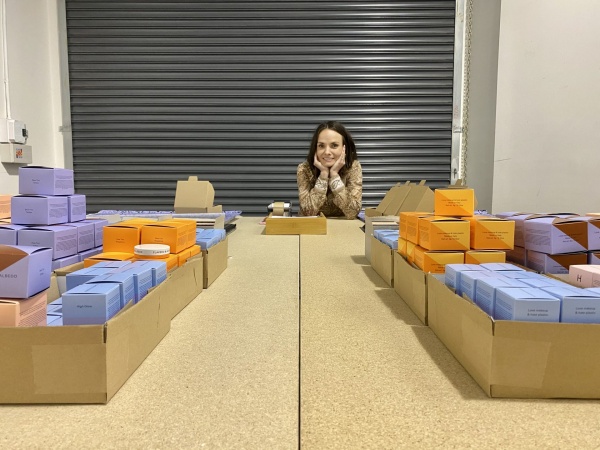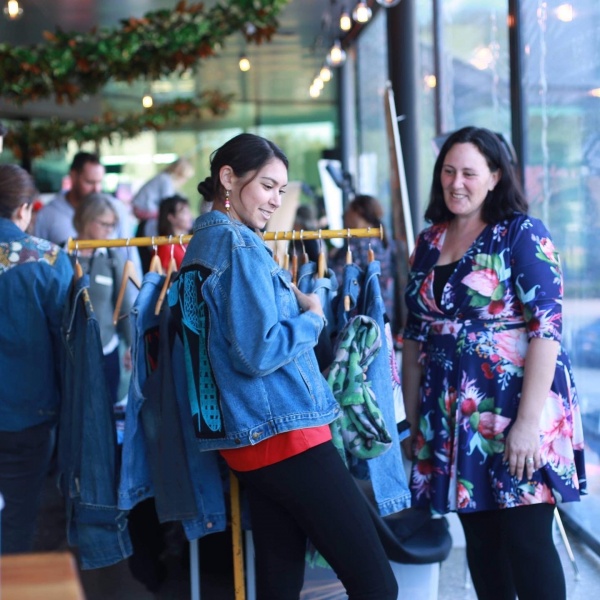
Deadly Denim at New York Fashion Week
- Culture
Celebrating International Women’s Day
These are the female founders in sustainability to watch
One of our favourite things about what we do is getting to meet amazing, inspiring women in the sustainability space. They are more often than not selfless, determined, infectious in their enthusiasm and always open to sharing their journey and lessons they have learned along the way. From sustainable business owners to activists and those just doing their part to create a positive impact, it’s not only rewarding to hear their stories, it also inspires us to make Green + Simple the best it can be for our community. In the lead up to International Women’s Day, we talk to five amazing women, each working toward shaping a more sustainable future.
Aleks Allen and Emily Perrett, Flavedo & Albedo
Friends and founders of plastic free beauty brand, Flavedo & Albedo, Aleks Allen and Emily Perrett don’t mince words when it comes to talking about starting a sustainable business. “It’s exciting and terrifying in equal measure,” Aleks says. “It has been a very steep learning curve because a lot of the things we’re trying to do haven’t been done before. With a preposterous amount of admin.”
The women, along with a third founder, created their clean, high-performance zero-waste beauty brand just three months ago, yet are already changing our expectations in the highly competitive beauty industry. The brand is completely plastic free, they use aluminium, glass and sustainable timber for its packaging, no mean feat for an industry that produces 76.8 billion single-use containers globally each year.

Flavedo & Albedo’s latest zero-waste beauty campaign
“We have always been freaked out by landfill,” Emily says. “Plastic in particular. The beauty industry stats are completely overwhelming. It’s almost paralysing.”
“It’s the sneaky plastic that really trips you up, like finding an alternative to the PE (polyethylene) plastic liners that sit inside most metal lids,” Aleks adds. “That took a while to figure out.”
But figure it out they did and they hope others will follow in their footsteps in 2021 and beyond. “The category really needs to have its ‘fast fashion’ or ‘keep cup’ year,” says Emily.
“Sustainability has to be about a lot of us making better decisions, not a few people being perfect. It’s got to go mainstream to have real impact. In the face of such a huge problem it can seem pointless, but small actions matter.”

Co-founder of zero-waste beauty brand, Flavedo & Albedo, Aleks Allen
Rebecca rickard, Deadly Denim
When Nyungar fashion designer Rebecca Rickard spent the summer of 2018 driving from Perth to Tasmania with her two sons, her dog and 40 custom made denim jackets in tow, little did she realise two years later, her sustainable fashion label, Deadly Denim would go from market favourite to the catwalks of New York Fashion Week. But that’s exactly how it played out for the Whadjuk Ballardong woman from the Nyungar Nation, who’s upcycled creations featuring designs from Aboriginal artists aim to connect cultures and give back to her community.
“It was such a proud and unbelievable moment, one I would never have dreamed of happening when I started,” says Rebecca.
Deadly Denim is one of many Indigenous owned businesses using fashion as a platform to educate and connect to traditional custodians and First Peoples of Australia. “So much culture and history was lost and hidden with colonisation, it is empowering for Aboriginal artists to authentically showcase their connection to country and culture,” Rebecca explains.
“Aboriginal people are and were the world’s first artists. We have the longest unbroken art tradition on earth. With this in mind it’s so important to have ethical and respectful purchasing.”
Rather than consciously prioritising sustainability, Rebecca says it’s something she has always honoured, that Deadly Denim was simply an extension of how she has always lived her life.
“When I first started recycling the jackets it wasn’t an intentional thought around sustainability it was just how I had always been in my own life.I op-shop and buy recycled nearly 95 per cent of everything from clothing, furniture, books and homewares . Once I started reading about the amount of pollution created by the fashion industry, it made me feel really confident around that decision.”

Deadly Denim founder, Rebecca Rickard
Lauren Branson and Cara Cooper, Your Food Collective
With food production and farming accounting for a third of the world’s greenhouse gas emissions, making choices like sourcing local and preferably organic produce, opting for a plant-based diet or cutting back on meat and dairy, is one way we can all help curb climate change. And it’s thanks to women like Lauren Branson and Cara Cooper, being part of the solution is now easier than we think.
Five years ago the cousins founded Your Food Collective, an online grocer that brings together a network of sustainable, local growers from meat producers to fruit and vegetable farmers within a 250 kilometre radius of its Newcastle, NSW distribution centre. Suppliers are paid fairly for their crops, produce is typically grown organically or with minimal intervention and orders are typically low waste and plastic free. It’s essentially the ultimate local farmers market experience with the ease of online shopping.
“We’ve reached a tipping point where we all need to do something about saving our planet, and I’m 100 per cent motivated to be part of the solution. We need change and we need it fast. It’s time for us all to step up,” Lauren says. “I’m passionate about making it as easy as possible for people to save the plant with the food on their plate.”
Your Food Collective is a carbon positive business, meaning that unlike carbon emitting supermarkets it actually removes carbon from the atmosphere. They do so by choosing to work only with regenerative growers.
“Their production methods are sucking carbon from the atmosphere and storing it in the soil. It also means the product tastes much better because it’s been going in healthy soil and a diverse environment,” explains Cara.

Lauren Branson and Cara Cooper, Your Food Collective
Related; Jeweller Holly Ryan on creating her new sustainable studio
Related; 5 things you can do now to help tackle climate change
